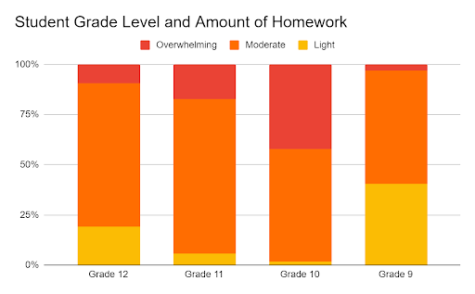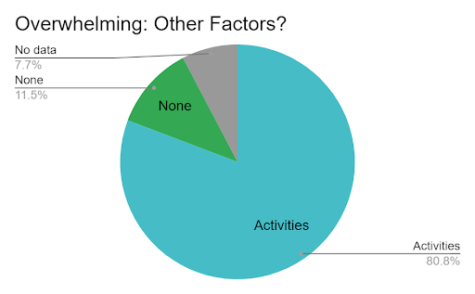Homework: Helpful or Harmful?
October 11, 2022
Homework is a frequently debated aspect of academics. Students despise it, parents don’t understand it, and sometimes even teachers complain about the work they give themselves through grading. Others say it is necessary and beneficial to childrens’ education. So, when is homework useful? Is it ever actually important? And just how damaging can homework be for students?
Academic Life
Many students enjoy going to school. “The social aspect of it is nice,” said one student, “Getting out, seeing my friends, and doing work in person…but it’s very stressful and has a lot of bad aspects to it like the stress and the workload…”
Some students have specific interests which they find fascinating to learn about. They enjoy the environment while they are in school, but what about when school follows them home? When asked about their workload, one student described how it feels to have too much homework:
“It’s like all the free time you had over the summer completely goes away. It’s like all your free time you want to spend either getting your work done so you don’t have to stress about it later, or just relaxing because you never have any time to yourself anymore.”
And what about students who participate in sports or theater? Students from each grade were surveyed on how much homework they have and whether or not they participate in a time consuming, school-related activity after school such as sports or theater.


The majority of students in each grade felt as though they have a moderate amount of homework, although around 42 percent of sophomores surveyed claimed to have an overwhelming amount of homework. If 42 percent of sophomores are overwhelmed each night, that should be cause for change. Even if a handful of students are struggling, they should be given help.
Practicality of Nightly Assignments
Students and teachers all seem to agree on the practicality of homework. Teachers and students alike consider busy work to be less helpful than other types of homework.
“A lot of teachers say they don’t believe in homework,” said one student,“they just assign work that you did not complete in class. I think that’s very fair because that teaches students to manage their time better and complete the work [teachers] assign and also have help when they need it in class.”
Having work that adds something to the things students learn in the classroom appears to be more beneficial than assigning homework for the sake of giving kids something to do. When interviewed on the same subject, health teacher Mr. Lovett shared a similar opinion. “I think homework can be valuable when used correctly, like if it’s used to reinforce something that you’ve taught in class or something that is going to enhance the learning aspect.” he explained, “…most of the stuff we try to do in class, so if you’re not able to finish in class then I might have people taking it home for work but most of the homework, if I am to assign it, might be like a weekly research that is quick, easy, and you usually have a week to get it done, just to stimulate discussion.”
Homework can be a wonderful tool for reinforcing ideas taught that day and even getting kids to be more engaged in the classroom. But what about when students just do not have the time?
Time Management is Everything
Pentucket has a huge population of successful athletes and outstanding theater kids. With this comes a wave of students who need to cram in their homework after games and performances. That can’t be good for their mental health, can it?
Referring to the previously described charts, of all students who consider their homework to be overwhelming, about 80 percent participate in activities after school.
Mr. Lovett’s response to being asked about correlations between homework and mental health is as follows: “I think it can [affect mental health] because a lot of students have things outside of school, so if it’s affecting sleep patterns and things like that…you have students that might go do a sport and then have work and then they’re doing homework and eating and showering and going to bed really late. I think that might have a negative effect, however, if it’s someone who’s going home, watching TV, playing video games, and then they’re doing their homework from 11 to 1 and then saying that they’re not getting enough sleep I think that’s a little bit of a different animal.”
For those who have an open schedule, are they putting unnecessary stress on themselves because of their after-school routine?
“Time management is everything,” Says English teacher Dr. Bent.
Students who prioritize their work are more likely to get it done stress-free, and getting work done early allows students to relax without the thought of deadlines looming over them.
Even so, not everyone can just get it done and out of the way. Some students put all their effort into the school day and are burnt out when they get home, where homework is the last thing they want to think about. What should be done then? Occasionally the student may need to decide between their mental health and their grades. Do they rest for a while or dive right into the rest of their work? It may be easy to say students can do their homework later if they need to rest, or that they can miss just one assignment if it means they feel better, but that is far from true. Students are constantly under pressure from parents, teachers, and themselves to do their very best.
Under Pressure
If a student decides to skip an assignment because they just can not handle it, several things could happen. The best possible outcome would be their teacher to allow an extension. If they are in a more rigorous course, however, they may see their grade drop. The new grading policy requires homework assignments to be worth no more than ten percent of their final grade, which relieves some tension but does little to fix a major issue. Once a student sees their grades begin to fall, they may feel disappointed in themselves and unmotivated to put effort into their future work. Other times students may work twice as hard to undo their mistakes.
If students spend all of their time focused on doing their best in school, they are not being their best selves.
“My mental health decreases when I am in school and continues to decrease as workload becomes heavier,” says Senior Dillon Metcalf. “I feel overwhelmed with homework…the quality required is higher than it used to be.”
Understandably, as students get older and take more advanced classes, the work should become more rigorous. But where do we draw the line between school life and home life? There is a common saying among adults, “don’t take your work home with you”. If an adult has a stressful 9 to 5 job, they do their best to forget about it at home and spend time relaxing with their families. By separating work from personal life, adults have better relationships with their family members and a better quality of life. These students, who are still children, do not have the option to do that.
So, what are students supposed to do? Many students agree that homework can be valuable, but it should not be a large task. Students at Pentucket seem to be in agreement that the main problem with homework is the time each assignment takes to complete thoroughly. Teachers assigning less homework would be ideal. If this is an unrealistic goal, nightly homework that is at least simple and not very time-consuming would be an improvement. Many classes already give little to no homework, and hopefully, others follow suit.











